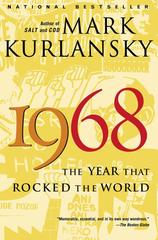 1968 was marked by what author Mark Kurlansky (Cod, Salt) called "a spontaneous combustion of rebellious spirits around the world." That tumultuous year included student protests and rebellions in the U.S., Poland, Czechoslovakia, France, Germany, Mexico and elsewhere; the growth of the Black Power, women's and antiwar movements; the Prague Spring; the Tet Offensive, marking a turning point for the U.S. in the Vietnam War; the assassinations of Martin Luther King Jr. and Robert F. Kennedy; police brutality during the Democratic National Convention in Chicago; and a deeply divisive presidential election. These events were amplified, Kurlansky says, by new developments in media, particularly television's new use of videotape, which didn't need to be developed, transmitted via satellites from around the world, making the war and protests more immediate.
1968 was marked by what author Mark Kurlansky (Cod, Salt) called "a spontaneous combustion of rebellious spirits around the world." That tumultuous year included student protests and rebellions in the U.S., Poland, Czechoslovakia, France, Germany, Mexico and elsewhere; the growth of the Black Power, women's and antiwar movements; the Prague Spring; the Tet Offensive, marking a turning point for the U.S. in the Vietnam War; the assassinations of Martin Luther King Jr. and Robert F. Kennedy; police brutality during the Democratic National Convention in Chicago; and a deeply divisive presidential election. These events were amplified, Kurlansky says, by new developments in media, particularly television's new use of videotape, which didn't need to be developed, transmitted via satellites from around the world, making the war and protests more immediate.
Some of what happened in 1968 had long-lasting significance, even continuing to the present day, including the Republican Party's Southern strategy and embrace of "law and order," as well as the Soviet invasion of Czechoslovakia, which destroyed many people's belief that the Soviet system could be reformed, leading to its end some 20 years later.
While there are some differences--including a pandemic and increasingly destructive climate change now--the year 1968 is eerily resonant in the year 2020. Substitute social media for TV "live" feeds, Black Lives Matter for Black Power, Trump for Nixon, and so on.
Kurlansky recounted the turbulent time in 1968: The Year That Rocked the World, first published in 2004. The book is available from Random House Trade Paperbacks ($18). --John Mutter

